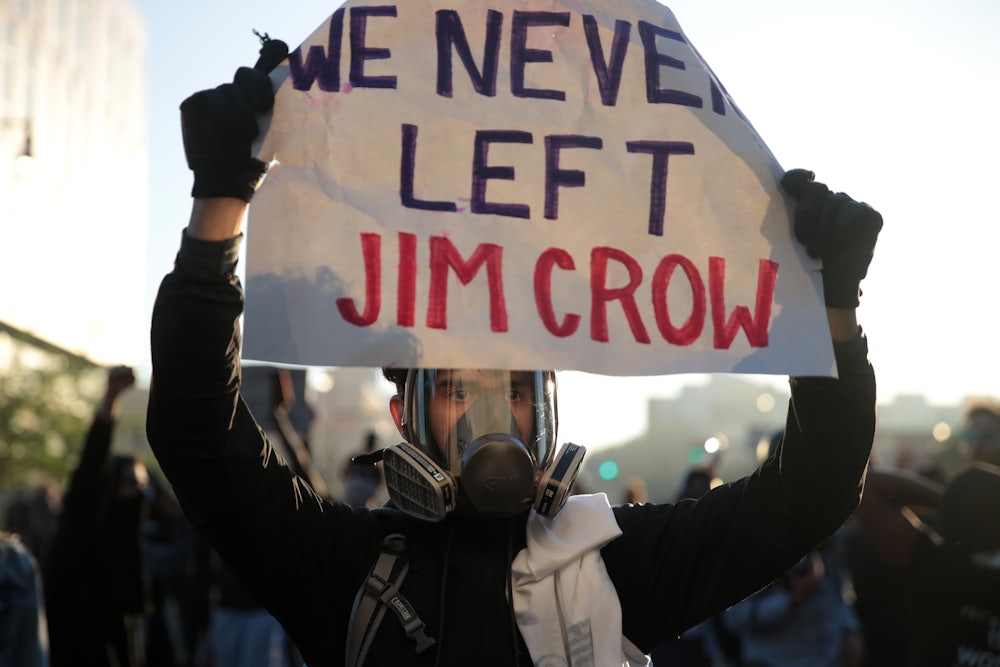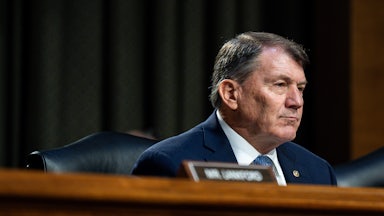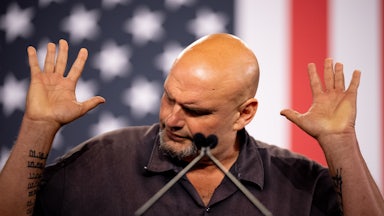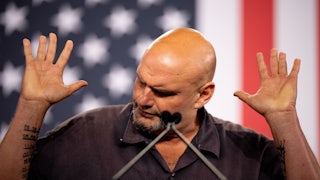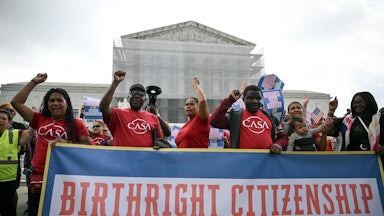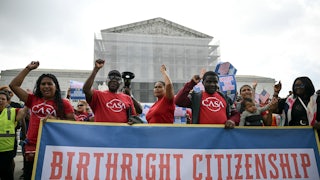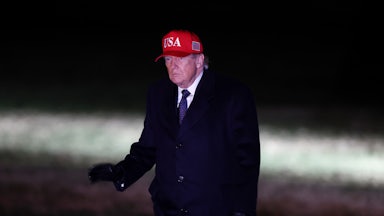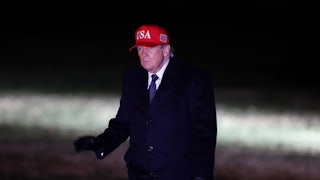It’s safe to say that in living memory, public trust in American elections has never been lower. A year into Joe Biden’s presidency, the statistics have become familiar: Roughly two-thirds of Republicans, and more than 40 percent of the general electorate, do not believe Biden’s 2020 victory was legitimate.
While Republican leaders pushing claims about the 2020 election being fraudulently decided ought to—and likely do—know better, the incentives are not hard to grasp. Pushing back against Donald Trump’s insistence that he won the election is politically dangerous within the GOP. But there’s a longer-standing tradition, as well: Hysteria about election fraud has served the GOP’s legislative aims reliably. Last year, under the banner of “election integrity,” at least 19 states imposed new restrictions on voting access, and additional restrictions are in the works. These run a wide gamut, from familiar methods (such as tightening voter ID requirements) to novel ones (like making it a crime to pass out bottled water at polling places).
If this moment represents a rare and novel crisis, it also reflects an old pattern. The use of election fraud claims to justify voter suppression has a deep history in the United States, and nowhere was it used more aggressively than in the post-Confederate South. During Reconstruction and the so-called “Redeemer” era, reports that Black voters intended to commit fraud served as grist for massive campaigns of voter suppression and intimidation. Ultimately, at the dawn of the Jim Crow era, this all culminated in a series of new state constitutions that systematically stripped Black men—and in many cases, poor whites as well—of their voting rights.
In speeches last month, Biden compared the January 6 insurrectionists to Confederate soldiers and likened the newest voting restrictions to Jim Crow policies. These comparisons were essentially apt—even if the laws in question are not nearly as extreme as those of the Jim Crow South. But the decades immediately following the Civil War, which are often overlooked in national memory, and which produced the Jim Crow order, may be the most instructive period for the present moment.
Southern fears about phantasmic voter fraud became widespread in the late 1860s, as ballot access was being extended to Black men on a state-by-state basis—and, not coincidentally, as the Ku Klux Klan was also expanding its reach. These voting rights were solidified in 1870, with the passage of the Fifteenth Amendment, which said no man could be turned away from the polls because of his “race, color, or previous condition of servitude.” It’s hard to imagine the psychological effect this must have had on white Southerners. Hundreds of thousands of freedmen were now eligible to participate in elections, with each of their ballots carrying the same weight as the vote of a white aristocrat. The region’s electoral composition was swiftly and radically transformed.
It’s important to acknowledge that in the late nineteenth century, many elections were extraordinarily corrupt. This was the era of Tammany Hall, in which patronage, bribery, and fraud were the order of the day. Tammany officials routinely filled registration lists with the names of people who were dead, in prison, or nonexistent. But at the same time, accusations of fraud—regardless of the facts in any given election—were de rigueur. It’s almost impossible to get a handle on the amount of fraud that was actually occurring; but scholarship from recent decades has suggested that overall, reports from the period may have been overblown. “The evidence,” as the scholars Howard W. Allen and Kay Warren Allen wrote in 1981, “is unsystematic, impressionistic, and by and large inconclusive.”
From reading the old newspaper coverage, however, one clear takeaway is that for the Democratic Party—which was aligned with the South’s former slave-owning class—and its allies, voter fraud claims took on a racist hue in the postwar context. Democrats had long been claiming that African Americans were unfit to vote, given their low rates of literacy and civic education (even though the white ruling class itself was responsible for this deficiency). It was also a common trope, going back many decades, to describe African Americans as shifty and dishonest. As soon as ballot access was broadened, reports of voter fraud started being overlaid on top of these claims. The narrative developed in Democratic newspapers that white Republican leaders were stealing elections, and that African Americans were being enlisted as their pawns.
A useful case study is the election of 1872, the first presidential contest after the Fifteenth Amendment was enacted. Ulysses S. Grant was running for reelection against the newspaper editor Horace Greeley. Southern Democrats, on the whole, were not enthusiastic about Greeley. He was a New Yorker, and thus not one of their own; and he represented the Liberal Republicans, who had broken away from the party of Grant. Still, over the course of the election year, they came to accept him as the lesser evil. They were desperate to have federal troops withdrawn from their states—in part because the troops oversaw elections and protected Black voters. Greeley made the withdrawal of troops the central plank of his campaign, saying he’d restore to the South what he called “local self-government.”
In the summer, each side started accusing the other of bringing out-of-state voters into Indiana, Ohio, and Pennsylvania to sway the results. In the Greeley-aligned newspapers, the accusations often had a distinct racist bent. The Pittsburgh Daily Post, for instance, warned its readers that Republicans were “importing negroes from other states and colonizing them here,” and were also training their “negro allies” in how to cast multiple ballots. And The Jasper Weekly Courier, in Indiana, claimed in September that the “first installment of negroes” had just arrived from Louisville. If white Republicans weren’t careful, the paper said, “they and their negroes might get their heads skinned.” (The Boston Globe, for its part, said Greeley’s supporters had hired 30 or 40 Black men to travel around Indiana and be touted as fraudulent voters.)
This news from up north was also syndicated in Southern papers, where it was often accompanied by calls for white readers to go keep watch at the polls on Election Day—with at least the implication that violence might be necessary. “Let our friends see to it that these gross frauds shall not be practiced at the ballot on the 5th of November next,” read a September 1872 dispatch in The Raleigh Weekly News. “Forewarned—fore-armed.” (In some states, appeals like these mingled with calls for blatant voter suppression, which were made without the pretense that it would make elections fairer.)
Thanks in part to the presence of federal troops, the only state that saw significant bloodshed at that year’s elections was Georgia. At a state election in Macon, in October, as many as seven Black men were killed (along with one white man), and as many as 30 more were wounded. According to The Macon Weekly Telegraph, a Democratic paper, an “extra police force” of white men—some of them surely Confederate veterans—had been recruited beforehand and posted at the polling site, with weapons in hand. The Telegraph claimed the violence had only broken out when Black voters tried to “take forcible possession” of the venue, for the purpose of cheating. A New York Times dispatch, by contrast, said the violence had been spontaneous and was instigated by white men who wanted to cut in line. All the news reports agreed that after this incident, Black voters were too afraid to go near the polling places, despite assurances from the mayor that they would be protected.
Coming, as it did, a month before the general election on November 5, there’s no doubt this violence in Georgia had a chilling effect in other states as the story was propagandized. It’s impossible to say how many Black voters stayed away from the polls, fearing for their lives, but it must have been a not insignificant number. On Election Day, the Times also reported that in Cincinnati’s largest Black neighborhood, almost every ballot cast by an African American was being challenged, leading to excessive delays for everyone waiting in line; and there were reports of Black men’s ballots being tossed out en masse in Indiana.
Grant nevertheless managed to win the election—and by the largest majority in decades. But the voter-suppression playbook would be repeated in future elections.
The 1874 contests in Alabama were a case in point. The Mobile Daily Tribune, a Democratic organ from what was then the state’s largest city, warned repeatedly that Republicans would try to cheat; and on Election Day itself, the paper called for every business to close so white men could patrol for fraud. “It is easy to recognize strange negroes,” the paper said. “Have them arrested at once, and lodged in the county jail, if they attempt to vote.”
In the town of Eufaula, rumors of an “invasion” by African Americans circulated among whites. Violence did break out at polls in both locations. In Eufaula, either seven or eight Black men were also killed in a riot, and 70 to 80 more were wounded. One or two Black men were killed in a riot in Mobile, and scores were arrested on fraud charges. The amount of intimidation that occurred that day, of course, is impossible to detect or quantify; nor is it easy to gauge the amount of fraud that did occur—as noted above, this was an era in which genuine corruption was prevalent. But when the ballots were counted, to no one’s surprise, the Democrats had won in a landslide, seizing both the governor’s office and control of the state legislature.
The federal project of Reconstruction was aborted in 1877, when the remaining U.S. troops were withdrawn from Southern states. For the next several decades, the conditions, political and otherwise, were mostly bleak for African Americans in the South. Now that Democratic officials had total control over most elections, stirring up panic about fraud may have seemed less necessary. But every Southern state did experiment with political alliances that spanned the color line, and in some cases, these did pose viable threats to the dominant party. Suppression campaigns kept up apace, and claims of fraud—often against Black voters specifically—were also published in many newspapers, including The Louisville Courier-Journal, The New Orleans Times-Democrat, The Baton Rouge Capitolian-Advocate, The Richmond Dispatch, The Chronicle Star in Pascagoula, Mississippi, The Wilson Advance in North Carolina, and The Chattanooga Daily Times, The Knoxville Whig and Chronicle, and The Pulaski Citizen, all in Tennessee.
Perhaps the most salient example comes from Wilmington, North Carolina, in 1898. From 1894 onward, North Carolina’s Fusionists, a coalition that brought together farmers and laborers of both races, had dominated every statewide election. It was arguably the most successful interracial partnership in the post-Reconstruction South. In 1897, an explicitly white supremacist campaign rose up to defeat it. As the election in 1898 drew near, the leaders of this campaign made unabashed calls for voter intimidation. “Go to the polls tomorrow,” said one Democratic leader at a preelection rally, “and if you find the negro out voting, tell him to leave the polls and if he refuses, kill him, shoot him down in his tracks.”
But spreading hysteria about fraud was also part of the Democrats’ strategy. Democratic newspapers warned for weeks that the election was in danger of being stolen, as the journalist David Zucchino showed in his 2020 book Wilmington’s Lie: The Murderous Coup of 1898 and the Rise of White Supremacy. The Wilmington Morning Star claimed illegal Black votes had been cast in every North Carolina election for years and called for “eternal vigilance” when the polls opened. The Semi-Weekly Messenger in Wilmington followed suit, writing that it was white men’s duty to “checkmate the rascals.” If peaceful methods failed, the Messenger said, “it will be necessary to use force and it will be done.”
Come Election Day, huge numbers of Black voters stayed away from the polls, fearing for their lives. The Democrats won handily. But the Fusionists remained in power in Wilmington’s city government, because the mayor and aldermen had not been up for reelection. Two days later, a white mob rampaged through the city, killing as many as 300 Black residents and forcing the mayor to resign at gunpoint.
It was no secret that election fraud truly was rampant in the South—but Democrats were primarily the ones responsible for it. Apart from violence and intimidation, their tactics included throwing out Republican ballots and misreporting vote counts from individual counties and precincts. Rigorous studies in the twentieth and twenty-first centuries, based on records from the period, have established this beyond dispute.
In 1890, Republicans in the North tried to do something about it. Henry Cabot Lodge, a congressman from Massachusetts, introduced a bill that summer that would have allowed the federal government to supervise elections more closely—with the aim of protecting Black voters’ rights. The Lodge Bill passed the House within weeks, but it died in the Senate, thanks to division among Republicans and filibustering by members of both parties.
The Democrats gained control of the House in the 1890 midterms, and they won the presidency and the Senate in 1892. In 1893 and 1894, they seized the chance to repeal all the federal election laws on the books.
At the state level, too, after the Lodge Bill failed, Democrats worked quickly to secure their hold on power. Between 1890 and 1908, almost every state government in the South took measures to systematically exclude Black men from the polls. Southern politicians repeatedly cited the need to prevent election fraud. But in a strange turn, they admitted now that their party was the one committing it. Stealing elections, they said, was better than allowing “negro domination” (a phrase they constantly invoked), but it wouldn’t do as a long-term strategy. The opening speech at Alabama’s 1901 constitutional convention was typical. “If you teach your boy that it is right to steal votes,” said John B. Knox, the convention president (and Alabama’s top corporate lawyer), “it is an easy step for him to believe that it is right for him to steal whatever he may need or greatly desire.” If election theft went on unchecked, Knox said, it would ultimately corrupt the morals of Alabama’s entire populace. “If we would have white supremacy,” he told the delegates, “we must establish it by law—not by force or fraud.”
Florida, Tennessee, and Arkansas were among the first states to take action, passing requirements like the poll tax between 1889 and 1892. And in 1890, Mississippi rewrote its Constitution to take more sweeping measures, including a subjective literacy test that made it possible to selectively block African Americans from the polls. South Carolina followed suit in 1895. In 1898, the U.S. Supreme Court ruled unanimously that Mississippi’s restrictions did not violate the Constitution; and after this decision, other states adopted similar laws: Louisiana in 1898, North Carolina in 1900, Alabama in 1901. By 1908, nearly every Southern state from Virginia to Texas had passed similar policies.
The rest of the story is familiar: Ballot access for African Americans was severely restricted in the South for decades. It took the Voting Rights Act of 1965 to overturn the policies of the Jim Crow era. In the aftermath, accusations that Black voters were committing fraud started to resurface immediately. As Ari Berman documents in Give Us the Ballot: The Modern Struggle for Voting Rights in America, fraud charges were raised in the 1966 election in Selma, Alabama, that served as the first major test of the new law. (The claims were thrown out by a federal judge.)
In recent decades, as voter fraud claims have been mounting once again, often the liberal response has been simply to debunk them on empirical grounds. Liberal politicians and pundits have pointed to the abundant evidence that elections are cleaner and more honest now than they’ve ever been. There’s nothing wrong with this approach, as far as it goes. But if claiming “fraud” is one of the most reliable tactics in political messaging—especially where racial minorities and immigrants are concerned—then countering it with evidence will never be enough. Historically, protecting the rights of minority groups has typically required the use of federal power.
Of course, this is precisely what Democrats in the legislature have been contemplating in recent months, in the form of the Freedom to Vote: John R. Lewis Act. It would restore portions of the Voting Rights Act of 1965 that were struck down by the Supreme Court several years ago and would give the federal government more authority to regulate elections. The similarities to the Lodge Bill are clear—in fact they’re uncanny. But also like the Lodge Bill, this legislation hit a snag in the Senate after passing the House, and its odds of moving any further seem bleak. Should a voter protection bill fail to pass, as seems likely, then election integrity will be truly endangered—if the 1890s offer any clue.
